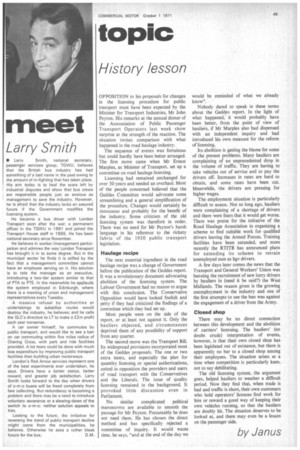meet
Page 51

If you've noticed an error in this article please click here to report it so we can fix it.
Larry Smith
• Larry Smith, national secretary, passenger services group, TGWU, believes that the British bus industry has had something of a bad name in the past owing to the amount of in-fighting that has taken place. His aim today is to heal the scars left by industrial disputes and show that bus crews are responsible people just as anxious as management to save the industry. However, he is afraid that the industry lacks an assured future if the Government modifies 'the licensing system.
He became a bus driver with London Transport soon after the war; a permanent officer in the TGWU in 1961 and joined the Transport House staff in 1965. He has been national secretary since November.
He believes in worker /management participation and admires the way London Transport has brought it in to some degree. But in the municipal sector he finds it is stifled by the fact that a management committee cannot have an employee serving on it. His solution is to rate the manager as an executive, introducing a two-tier system similar to that of PTA to PTE. In the meanwhile he applauds the system employed in Edinburgh, where there is a meeting of union and management representatives every Tuesday.
A massive refusal by authorities or undertakings to subsidize routes would destroy the industry, he believes; and he calls the GLC's directive to LT to make a £2m profit each year nonsense.
A car owner himself, he commutes by public transport, and would like to see a ban on car commuting within five miles radius of Charing Cross, with park and ride facilities provided. A lot more could be done with much less expenditure by improving public transport facilities than building urban motorways.
London's Red Arrow services represent one of the best experiments ever undertaken, he says. Drivers have a better status, better reward, and greater job satisfaction. Larry Smith looks forward to the day when drivers of o-m-o buses will be freed completely from fare collecting. But redundancy is becoming a problem and there may be a need to introduce voluntary severance or a slowing-down of the switch to o-m-o; neither solution appeals to him.
Looking to the future, the initiative for reversing the trend of public transport decline might come from the municipalities, he believes. Otherwise he sees a rather bleak
future for the bus. D .M .


















































































































